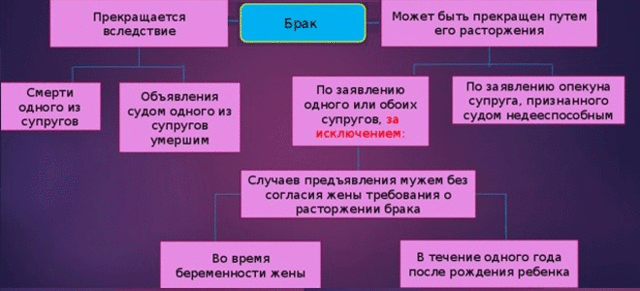It is a rare marriage, even one concluded out of great love, that is not tested by life. Spouses who have experienced a crisis come out of it in different ways: some save their family, others decide to separate. Official relations between spouses arise only in the registry office, but they can be terminated in accordance with the norms of Chapter 4 of the Family Code of the Russian Federation (FC RF) and the law “On Acts of Civil Status” both in the registry office and in the court of general instance. Divorce options will directly depend on certain factors:
Spouses who have experienced a crisis come out of it in different ways: some save their family, others decide to separate. Official relations between spouses arise only in the registry office, but they can be terminated in accordance with the norms of Chapter 4 of the Family Code of the Russian Federation (FC RF) and the law “On Acts of Civil Status” both in the registry office and in the court of general instance. Divorce options will directly depend on certain factors:
- presence of minor children
- readiness for a peaceful resolution of divorce issues
- property claims
Therefore, the parties to the marriage relationship must have grounds for its termination.
On what grounds can a marriage be dissolved through the registry office?
The sooner the spouses decide to separate, the easier the divorce procedure is. Couples who do not have children and have decided on their own property issues can divorce their marriage without going to the courts. To do this, it is enough to submit an application to the registry office, which in a couple of visits will free the husband and wife from the “chain of Hymen” administratively.
The termination of a marriage relationship is formalized through the civil registry office at the place of residence or where the marriage was registered.
The grounds for termination of family relationships include:
- application of the husband or wife, filed separately or jointly;
- death of husband, wife or official declaration of one of them as dead by a judicial authority;
- recognition of a previously concluded agreement as invalid due to its fictitiousness;
- submitted by the guardian of one of the spouses recognized by the court as incompetent, a corresponding application.
Important! If one of the spouses has died or has been declared deceased by a judicial authority, the marriage union is dissolved from the date of registration of death or the date of entry into legal force of the court decision. There is no need to specially formalize the termination of the marriage relationship after this
If a person was declared dead due to a long absence from his place of residence, but the fact of death itself was not recorded, then in accordance with Article 26 of the RF IC (clause
- if he appears at home, the marriage, on the basis of a jointly submitted application of the spouses, is restored by a court decision, which automatically cancels the previous decision. If the second spouse entered into a new marriage during the absence of the missing party, then in accordance with Art. 26 RF IC (clause
- a previous marriage cannot be automatically restored. To do this, the spouse must first dissolve the new marriage and then ask the court to register the old marriage.

It is possible to officially separate through the registry office even if you have minor children, but only on the following grounds:
- incapacity of one of the spouses;
- he was declared missing;
- conviction of the spouse for a term of more than 3 years.
Grounds for divorce through court
Divorce proceedings are not always painless and by mutual agreement. There are situations when the intervention of a judge is required:
- if children were born in the marriage who had not reached the age of majority at the time of divorce;
- if there are mutual claims regarding jointly acquired property;
- one of the spouses does not agree with the divorce.
What grounds will be valid for a divorce through court?
To obtain a divorce, the plaintiff must provide the court with compelling reasons why the marriage cannot be preserved. In accordance with the provisions of Article 17 of family law, the most compelling grounds that may serve for the dissolution of a marriage include:
- abuse of alcohol or drugs by a man or woman and unwillingness to be treated for these serious diseases; If the spouses have small children in such a situation, this can lead to danger to their health or even life;
- immoral behavior of one of their spouses, leading to constant stress for the second and their joint minor children;
- neglect by the spouse of obligations to financially support the family. This is especially true during the mother’s pregnancy and the child’s infancy. At this time, a woman is not able to provide herself and her child with money and acquire the necessary material values;
- personal (cooling of relationships, disrespect for spouse, lack of trust, hostility;
- sexual (betrayal, disharmony, lack of attraction).
Moreover, if the divorce process involves deeply personal issues that the spouses are not ready to share, they can be considered in a closed court session.
All these cases are valid grounds for divorce in court.
Important! It should always be remembered that a marriage is concluded on a voluntary basis, therefore no one under any circumstances has the right to force a man or woman to live together. Divorce in such a situation will sooner or later take place actually and legally
In what cases should the judicial authority not be interested in the reasons for the dissolution of a marriage?
In accordance with the norms of Article 22 of the RF IC, marriage relations are terminated first of all if the spouses decide that further life together is inappropriate and impossible, primarily for the reason that the relationship between a man and a woman will contradict the interests of their children minor age.
Based on statistical data, family life ends in 70% of cases due to financial problems, infidelity or abuse of alcohol and drugs by one of the spouses. If the parties express mutual consent to divorce, then the judicial body, within a month from the date of registration, considers their claim, without finding out the real motives for terminating the marriage.
Even if the parties have minor children, but agree to dissolve the marriage relationship, the court in such a situation will act as a registry office. In this case, the judge will not have to find out the reasons why the parties want to annul the marriage and take measures to reconcile them.
In accordance with the provisions of Article 23 of the RF IC, the court is obliged to satisfy the demands of the parties without clarifying the reasons for the divorce.
In what cases is a marriage declared invalid by the court?
Due to ignorance of the norms of family law, it is possible to confuse the grounds for invalidating a marriage with the grounds for dissolving a marriage. Any marriage between a man and a woman can be dissolved, but not every marriage can be declared invalid.
The grounds for the nullity of a transaction between a man and a woman include:
- deliberate concealment of information from one of the parties about the state of their health;
- concealment of other essential information provided for in Articles 12-15 of the RF IC.
 To avoid problems during divorce, you should seek help from a specialist.
To avoid problems during divorce, you should seek help from a specialist.
Possibility of dissolving a marriage without the prior consent of the other party
In accordance with Article 19 of the RF IC, the civil registry office has the right, taking into account a number of significant and mandatory reasons, to dissolve the union between spouses without the prior consent of one of them.
Such circumstances include:
- recognition of a husband or wife as incompetent by decision of a judicial authority on the basis of a procedure carried out in accordance with the norms of Articles 281-284 of the Code of Civil Procedure of the Russian Federation;
- recognition of one of the spouses in court in accordance with the provisions of Articles 43 and 44 of the Civil Code of the Russian Federation and Art. 280 Code of Civil Procedure of the Russian Federation for the deceased;
- conviction by a court of one of the spouses for a crime committed to imprisonment for a term of more than three years.
If the husband or wife provides one of the specified evidence to the registry office and confirms it with documents, then the marriage is dissolved without identifying additional reasons. The presence of common underage children will not be an obstacle.
If one of the parties is against divorce, and the second files a lawsuit, justifying its actions with arguments such as, for example, different characters or simply unwillingness to continue living together, the court, in order to preserve the family, may not accept these frivolous arguments as weighty and give to the spouses in accordance with paragraph 3 of Art. 22 RF IC time from one to three months for reconciliation.
Any arguments of the spouse presented to the court to justify the divorce cannot be accepted by the court as valid if his wife is pregnant or they are raising an infant under 12 months.
In this situation, in accordance with the provisions of Article 17 of the RF IC, the spouse’s statement of claim will not be accepted at all.
Divorce in this situation is possible after the specified reasons disappear or if the woman herself is the plaintiff.
Spouses must understand all these nuances if they wish to file an application with the registry office or a lawsuit in court for divorce and simultaneous collection of alimony.
That is why it is best to entrust such work to an experienced family relations lawyer, who will prepare the necessary documents and correctly substantiate his client’s arguments, which will lead to a quick and psychologically painless completion of the divorce process.
Divorce is not an easy undertaking, both legally and psychologically. But no matter what the basis for your disagreement, the “winner” will be the side whose interests are represented skillfully and wisely.
Particularly dramatic are the disputes in which the fate of minor children is decided. So is it worth the risk? Use the services of a divorce lawyer who will impartially assess your situation, take care of all the paperwork and achieve the optimal outcome of the case.
Good reasons for divorcing your husband

Love is an unpredictable feeling. Not every married couple manages to maintain love, which often causes the dissolution of marriage. The reasons for the dissolution of a marriage can be very different, subjective or objective, but the spouses cease to experience warm and reverent feelings for each other, as they once did in their youth.
Reasons for divorce in the statement of claim
Getting a divorce is much easier than saving a family. The procedure for dissolving a marriage is not a pleasant event. Each of the spouses, of course, has a reason for this, interpreting what is happening as a consequence of misunderstanding and personal ambitions.
Filing for divorce is a simple matter. However, it is important to understand that not every couple can be divorced at the registry office. A marriage union can be dissolved in court if:
- there is common property acquired jointly during the existence of the family;
- children who have not reached adulthood are growing up;
- the issue of child custody has not been resolved;
- no agreement has been reached on the payment of funds that will be used to support the incapacitated spouse.
The circumstances of the dissolution of family ties influence what reason should be indicated in the statement of claim. This document may or may not contain grounds for divorce:
- if the decision to divorce was made mutually by both husband and wife, then the reason may not be indicated;
- If one of the spouses does not agree to terminate the family relationship, the claim must indicate the basis for such a decision. The court, after studying the information received, announces an objective decision regarding the preservation of the family, and may also set a deadline for reconciliation.
Attention: in the statement of claim you should not write a reason of an intimate or sexual nature. Such a “nuance” will slow down the decision-making process.

Grounds for divorce in court
Based on the current legislation (Article 22 of the RF IC), public authorities can dissolve a marriage in court if it is recognized that it is impossible to maintain family ties.
In order for this process to be completed as quickly as possible, the claim should indicate a reason that, in the opinion of the judge, should be convincing.
Thus, the grounds for divorce in court can be of a different nature:
- private;
- domestic;
- material;
- moral (treason);
- intimate.
It is important to know: the main conditions for divorce are filing a claim in court.
Official reasons for divorce
According to the law (Article 16 of the RF IC), a marriage can be dissolved in such cases if:
- one of the spouses has died or is declared dead;
- An application for divorce by mutual consent or from one of the spouses has been submitted to government authorities.
It is worth taking into account the fact that if a husband or wife is recognized as incompetent or missing, the second spouse has the legal right to file a lawsuit requesting a divorce (Part 2 of Article 19 of the RF IC).
The official reasons for divorce in a divorce petition may be the following:
- the spouses did not agree on character. Time-tested feelings revealed a lack of mutual understanding in the relationship. If there are no minor children, the judge will consider this circumstance to be a reason for divorce;
- one of the spouses has bad habits (drug addiction or alcoholism). Domestic violence is also grounds for filing a claim in court. However, it is worth considering that the above facts will need to be documented (certificate from narcology, police). If it is not possible to present such certificates to prove the inadequacy of the spouse, it is better not to write such a reason in the statement of claim;
- conducting business separately, as well as the desire to create a new family. To be convincing, such a reason must be confirmed by witnesses who have reached the age of majority.

If there are children in the family
When there are young children in the family, personal reasons alone will not be enough for the judge to decide to start divorce proceedings. In such situations, it is better to refer to financial difficulties or domestic reasons for divorcing your husband in court.
According to the law (Articles 80, 89 of the RF IC), both spouses must take part in raising the child and provide each other with financial support. Thus, the claim can indicate such circumstances as:
- lack of desire of the spouse to work;
- large expenditures of money from the family budget for personal needs;
- little or no participation in the process of raising a child;
- the spouse refuses to provide financially for the family.
The most common causes of divorce
The existing reasons for divorce for the court can be quite serious. So, the reasons include:
- cheating husband or wife;
- violation of the vows given during marriage - to love in joy and sorrow. For example, a spouse has found “joy” for himself when his significant other is in the maternity hospital. Such situations can undermine trust in each other and cool feelings;
- poverty;
- lack of personal housing. Living together with relatives or renting apartments negatively affects not only relationships, but also the family budget;
- presence of bad habits;
- sexual incompatibility between spouses;
- psychological disagreements – the lack of skills or knowledge of one of the spouses to resolve conflict situations, which leads to misunderstanding between individuals;
- infertility.
Women, unlike men, are much more patient and resilient. If the wife decided to file a claim, then she had good reasons for divorce for the court. As a rule, a woman, feeling a threat to the health of her children and her own (both physical and psychological), decides to “dot the i’s.” Similar situations happen if the spouse:
- abuses alcoholic beverages or drugs;
- possessed by fits of anger without any reason;
- a brawler and has a tendency to “let loose” on members of the household;
- psychologically unbalanced due to illness.
If there is a threat of physical and moral violence against the wife and children, the law is on the woman’s side. In such situations, it is important to immediately seek help from law enforcement agencies, who are also required to document the call received with a detailed description of the problems. The beatings will be examined by a traumatologist.
What to indicate when divorcing a marriage with the assignment of alimony to one of the spouses The presence of minor children in the family requires writing a statement of claim for divorce with demands for alimony payments to one of the spouses. It is allowed to indicate any reason in the application, which will serve as a basis for divorce. All payments are received by the parent who remains with the children.
It is important to know: a photocopy of the child’s birth certificate, notarized, must be attached to the application.
In case of violation of clauses of the marriage contract
Many married couples sign prenuptial agreements. It is important to understand that such a document regulates property relations. According to the law (Article 25 of the Civil Code of the Russian Federation, Article 4 of the RF IC), violations of obligations under the contract cannot serve as a condition for divorce in court. When a family union is dissolved, spouses simply receive what they previously agreed upon.
How to write the reason for divorce correctly
A petition for divorce is an official document. The reason for divorce (examples) in this document is stated briefly but succinctly. It will be enough to write a few sentences that fully reflect the essence of the issue.
No matter how painful and difficult it may be, emotions and anger should be kept “to yourself” when drawing up a statement. Such composure will allow the family union to be dissolved quickly.
Grounds and procedure for divorce in court and through the registry office
Termination of marriage is regulated by the RF IC.
Grounds for divorce
The reasons for divorce may be:
- Death of one of the spouses;
- The court recognizes one of the spouses as deceased;
- Termination of marriage at the request of one of the spouses or both spouses, as well as at the request of the guardian of one of the spouses if he is declared incompetent.
This list of circumstances is closed.
The death of the spouse must be confirmed by appropriate certificate. In this case, the marriage union ceases to exist at the time of the death of one of the spouses automatically.
You can find out the reasons that can be indicated in the marriage application in this article!
What documents are needed for divorce?

Main package of documents:
- Citizen's passport;
- Statement;
- Marriage registration certificate;
- If there is a child, his birth certificate;
- Confirmation of payment of state duty.
Additional documents that may be needed for divorce proceedings in court:
- Certificate confirming the death of one of the spouses;
- Marriage contract;
- A certificate confirming that one of the spouses is infected with HIV;
- Correction from the police that one of the spouses has gone missing.
Note!
For the court, it is necessary to prepare photocopies of all documents in advance, since they will be attached to the case.
The divorce application must include the following information:
- Full name of the authority to which the application will be submitted;
- Data from the passports of both husband and wife;
- The reason why the citizen decided to get a divorce;
- Full information about children, if any;
- An indication that there are no claims against the spouse;
- List of documents that will be attached to this application.
Additionally, the court may require the provision of the following data:
- Information about the parents’ salaries in order to correctly determine the amount of child support;
- An inventory of all property, as well as its valuation (if the spouses intend to divide the property in court);
- Information about the state of health of the spouses, both physical and psychological;
- Other necessary data.
Features of divorce administratively through the registry office
The procedure for divorce through the registry office

At the registry office, a divorce is made only if both the husband and wife agree to terminate the marriage relationship, and there are no minor children in the family.
Unilaterally (at the request of one of the spouses) (link), a divorce can be registered at the registry office if the second spouse:
- Declared incompetent;
- Serving a sentence in a correctional institution (term - from 3 years);
- Missing.
For a divorce at the registry office, you must pay a state fee. The amount today is 650 rubles (from the husband and wife separately, if the divorce is a mutual decision) and 350 rubles if the application for divorce is filed unilaterally for the reasons stated above.
According to the RF IC, in the event of mutual consent of the husband and wife for divorce, it is carried out 30 days after filing the application.
The procedure for dissolving a marriage in the registry office:
- Payment of state duty;
- Submitting an application;
- Transfer of necessary divorce documents.
Judicial procedure for divorce
Judicial divorce is dealt with by the Magistrates' Court.
The grounds for termination of a marriage through the court are:
- Minor child;
- The husband or wife does not agree to divorce;
- Deliberate evasion of a husband or wife from divorce.
To consider the case in court, one of the spouses must file a corresponding application.
When submitting an application to the court for divorce, you can indicate your desire to divide property and assign alimony to the child.
The state fee for considering a divorce case in court is 600 rubles.

The application must indicate the reason for the dissolution of the union, the date of registration of the official relationship, the presence of joint children, and the available grounds for refusing to issue an administrative divorce. If you have children, it is important to indicate the conditions of residence after the divorce.
- If the spouses manage to agree on all points of the divorce (with whom the child will live, how to divide property, the amount of alimony), you can count on a quick divorce (one month after filing the application).
- In case of a dispute or one of the spouses insists on reconciliation, the court may give the family a period of 3 months to sort things out.
Three grounds for divorce in court
 Kalinina Evgenia, economist by education and linguist by vocation. Editor-in-Chief of the Alimenty-urist.ru project. Has 11 years of experience working in various publications.
Kalinina Evgenia, economist by education and linguist by vocation. Editor-in-Chief of the Alimenty-urist.ru project. Has 11 years of experience working in various publications.
Divorce is the termination of family relationships in the manner prescribed by law. The divorce process is regulated by articles from the RF IC, which clearly stipulates the grounds and procedure for terminating family relationships. Legislative acts predetermine that divorce is carried out in court and through the registry office.
Grounds for divorce in court
Art. 16 of the RF IC provides a list of grounds for termination of family relationships between spouses, these include the following circumstances:
- death of one of the parties;
- application from one of the spouses;
- statement of the guardian if the citizen is declared incompetent.
Important! The law also provides for some restrictions on the rights of one party. In particular, the husband cannot divorce the marriage without obtaining the consent of the wife. The restriction applies provided that the spouse is pregnant or raising a baby under one year of age.
Legal relations are terminated by the court or civil registry authorities.

Divorce in court
The law provides for the following grounds for divorce in court:
- presence of minor children in the family;
- disagreement with the divorce of that party;
- the citizen’s opposition to the act of registering the termination; the person may not express an obvious objection, but by his actions he interferes with the process, for example, he does not appear at the registry office at the specified time;
- existence of property disputes.
If a family with minor children is divorcing, the judicial authority will deal with the divorce. If there is an agreement between the spouses on all property issues and they agree on the issue of residence/maintenance/upbringing of minors, citizens can go to the magistrate. If there are any controversial situations, the issue is resolved in the district courts.
Divorce in the registry office in the presence of minor wards is also possible, if there are the following grounds:
- children are not common, but are related by blood to one of the parents;
- one of the spouses is in prison after being convicted for 3 or more years;
- one of the spouses has the status of a missing citizen.
Consideration of a case in court is possible only if there are legal grounds - a statement from the applicant. The union is dissolved only if the parties can prove that their life together is impossible.
In the claim, the applicant must indicate the reason for the divorce, justify and prove his point of view. Participants in the process are given the opportunity to think about their decision and find ways to save the family.
But if all methods have been exhausted, the parties retain their desire to divorce, the court decides the following issues:
- property division;
- with whom will persons under 18 years of age stay (if any);
- how the rights/responsibilities of each party will be implemented in the issue of raising wards;
- assignment of alimony obligations.
Statement of claim
The claim must include the following information:
- name of the court + full name of the judge;
- plaintiff’s details (full name + address + passport details);
- name of the defendant (full name + place of residence);
- reason for divorce + justification;
- confirmation of the grounds;
- reasons why termination cannot be carried out through the registry office;
- list of attached documents.
Termination procedure in the absence of consent of one of the parties
In this case, the marriage is dissolved only if the court determines that further reconciliation of the family is impossible. When considering a case and having a refusal of divorce on the part of one participant in the process, the court has the right to take conciliatory measures.
For this purpose, a break in the process is assigned for a period of up to three months; this time is given to the spouses to think about it. In a situation where the enforcement measures did not prove to be valid, and one party continues to insist on divorce, an appropriate decree is made.
Based on a court decision, a divorce is recorded in the registry office with the termination of marital relations. The parties receive a certificate confirming the fact of divorce.
Termination by mutual consent
If there is consent of both parties, and there are no disputes regarding children and property, the court has the right to divorce citizens without finding out the circumstances that separated the family.
The written consent of the spouses regarding the maintenance, upbringing, and residence of children can be taken as the basis when making a court decision.
If the agreement does not violate the rights of children or contradict the law, then it receives the status of a writ of execution and is binding. The court has the right to issue a decision on termination no earlier than one month from the date of application.
Termination of relationship upon termination

A marriage is considered officially dissolved from the moment the corresponding entry is made in the registration book or from the date the court decision comes into force. Termination based on a court order is also subject to registration in the book in the manner prescribed by law. An extract from the court decision is sent to the registry office within three days from the date of the decision. Citizens do not have the right to remarry until they receive a divorce certificate.
Divorce through court in the presence of minor children
If there is an agreement between the partners, the magistrate’s court enters all issues into the protocol. The document is signed by both parties, thereby expressing their agreement on each agreed upon point. After the court ruling, the agreements will be binding.
When the parties cannot reach an agreement, the case is referred to a court of general jurisdiction.
When considering the situation, two aspects are taken into account: material (type, amount of material support) and psychological (issues related directly to the upbringing and development of children).
Features of divorce proceedings with minors:
- divorce proceedings are subject to public hearings;
- in the interests of children, the court may deviate from equality of shares when assigning alimony payments;
- when assigning alimony, the court takes into account the financial and social status of each party;
- persons over 10 years of age can express their opinion on issues that directly concern them (who to live with, how to communicate with the second parent);
- The opinion of a minor is taken into account by the court if it does not contradict his interests.
By clicking on the button, you consent to the processing of your personal data and agree to the personal data processing policy.
Reasons for divorce
What are the main reasons for divorce? General phrases like “insurmountable differences” or “didn’t get along” usually hide more complex reasons - and sometimes a whole complex.
Why do people get divorced? This interests many not at all in a philosophical or psychological way, but because these reasons need to be stated in the statement of claim for divorce, and the ease of the case will depend on how well they are formulated.
What are the most common grounds for ending a marriage?
It is not always possible to single out one reason for divorce; often a whole complex of contradictions leads to it.
And yet, statistics highlight the most common causes of divorce: bad habits lead: addiction to drinking; there are problems with an apartment not far from them, due to which they have to live with relatives; what is called “they didn’t get along”; financial disadvantage of the family.
All other reasons are much less common, but you can still list another dozen and a half. Next, we will take a closer look at all the common reasons why people get divorced, grouping them into three main categories: personal reasons, domestic problems, financial difficulties.

Personal reasons
The reasons for divorce will be personal in any case, which is why this formulation is the most streamlined and incomprehensible of all. What exactly are the reasons behind it? What could be behind personal reasons? For example, there was love, but it passed. Over time, feelings tend to become less strong, but they may even go away or even be replaced by hostility.
And when the feelings pass, everything that was not noticed before now begins to irritate, many of the spouse’s shortcomings that previously seemed completely insignificant grow to unbearable proportions. Well, missing feelings are quite grounds for divorce.
After all, why is it needed then? Moreover, even in court this reason can be considered quite compelling.
Everyday problems
This includes, first of all, alcoholism; other addictions, such as drugs or gambling, should also be included in this group.
Other everyday problems can arise from the use of alcohol or drugs - after all, a spouse in an altered state of consciousness can become aggressive, treat children or his wife cruelly, and also have a bad influence on children - all these are good reasons for divorce.
Everyday problems also include mental disorders that lead to unpleasant consequences.
Please note: when referring to alcoholism, violence, etc., a certificate from the relevant institution will be required.

Financial difficulties
This is the lack of personal housing, due to which you have to live with your parents, which often leads to conflicts. Of course, from the point of view of preserving the family, it is always better to live in a separate apartment.
Also, the reasons for divorce in this group include the reluctance of one of the spouses to work at all or to work as required, and to contribute to providing for the family. Or one of the spouses may consider the other’s expenses too high.
In a word, the options are different, but they all boil down to the fact that the spouse, or even both spouses, believe that, from a financial point of view, it would be more profitable to live separately.
Statement of the reasons for divorce in the statement of claim
Should the reasons for the dissolution of the marriage be indicated in the divorce application? You don’t always want to make the grounds for divorce public; sometimes spouses want to keep them to themselves. Whether it will be necessary to provide a reason or not depends on the scenario in which the divorce is taking place. If both spouses agree to it, then there is no need to indicate them.
It’s a completely different matter if only one of them demands a divorce, and the second one opposes it.
In this case, the court will consider the possibility of appointing a special procedure for their reconciliation (it will be discussed in more detail), and the reason for the divorce plays an important role in deciding whether it is worth appointing or whether it is worth doing without it, since reconciliation is impossible, and even dangerous for one of the spouses.
That is, the formulation of the grounds for termination of marriage is really important, and therefore here are a few rules on how to draw it up correctly:
When indicating the reason, always remember that it must be clear and understandable to the judge and be filled with specifics.
For example, if a divorce occurred due to a violation of a marriage contract - this is not a very common reason, but it still happens, then the application should be written as such, and it should also be specified which clause of the contract was violated by the spouse. We are talking about the judge, there is no need to hide anything from him. And you certainly shouldn’t dwell on vague formulations like “for personal reasons” - indicate exactly what personal reasons you are talking about, what exactly you don’t like about your marriage so much that you are forced to get a divorce. The more clearly the reason is stated, the fewer questions the judge will have to ask later.
At the same time, while specifics are good, you shouldn’t always get carried away with them. For example, lawyers do not recommend citing sexual dissatisfaction as a reason for divorce.
This is largely due to the fact that if the need for love and respect in marriage is directly spelled out in legislation, then reference to missing feelings or respect that has disappeared due to certain actions can be considered really significant.
But regarding sexual relations, the legislation is silent, and therefore it is difficult to attach a reference to them to it. Therefore, if you are getting a divorce precisely because of problems in the intimate sphere, it is recommended to refer to missing feelings. Adultery can also be accepted as a reason.

Now let’s move on to frequent formulations that describe the reasons for divorce from your husband - one of them can be taken into account when drawing up an application. But it should be remembered that this is just a general formulation, and it needs to be made more specific, pointing specifically to your circumstances.
The most general formulation looks like this: “Due to the loss of feelings of love and respect for the spouse.”
It is advisable, of course, to indicate what caused this loss - and, if this indication is significant enough, the reason for the loss of these feelings may be betrayal, constant disagreements on important issues, the emergence of personal hostility, inappropriate behavior of a spouse, and so on.
If you have already been living separately for some time, then you can strengthen the wording with a phrase like “For the last three months - since the beginning of February, we have not lived together and do not have a common household.
I consider reconciliation impossible” - such a maxim can clearly indicate to the court that the spouse who filed the application is not at all inclined towards reconciliation, and this procedure can be dispensed with.
The court will also suggest the same idea by clarifying that not only the feelings have passed, but one of the spouses experiences hostility towards the other, or even both towards each other. For example: “We ask for a divorce because we experience mutual hostility and consider it impossible to save the family.”
Is it possible to reconcile spouses in court?
It also happens that one of the spouses decides to file for divorce on the spur of the moment, and then regrets it.
To prevent divorce in such cases, courts sometimes set a deadline for reconciliation. The basis for such a decision by the judge may be the absence (in his opinion) of an irreversible breakdown of the family and the possibility of its preservation. There are no clear criteria by which a period for reconciliation should be assigned or not assigned - it is at the discretion of the judge.
But naturally, this period will not be assigned if both spouses agree to the divorce, but only if one of them opposes the divorce.
In this situation, the court must find out the following circumstances:
- how family life went;
- why spouses are divorcing - all the reasons for divorce on one side, and the objections to them on the other;
- Is it still possible for the spouses to continue living together, provided that their interests are not infringed? Is it possible to eliminate the reasons why one of the parties decided to divorce.
The period for reconciliation is set by the judge, based on his own considerations, and can vary greatly - the minimum is usually two weeks, the longest is three months.
If, after this time, reconciliation has not occurred, and one of the spouses still does not want to divorce, then a new deadline can be set, provided that the judge still sees the prerequisites for possible reconciliation.
But this is still unlikely; as a rule, if the period for reconciliation does not yield anything, the divorce process comes to its logical conclusion.
Of course, more often than not this period for reconciliation is nothing more than a formality that must be served, but in some cases it actually has an effect and leads to the fact that the spouses still manage to resolve their problems and save the marriage.
And the fact that things have gone so far serves as an incentive to change and find a way out of the current situation. The time allotted for reconciliation allows the parties to cool down and rethink their actions and motives.
But when the initiator of the process is firmly convinced that nothing like this is happening and will not happen, you can try to shorten the period given for reconciliation, but this must be done by giving arguments in favor of the fact that no reconciliation is possible.
For example, previously unspecified reasons for divorce, to the same judge who is conducting the process.
There are no appeals against the period of reconciliation, since this is not a final decision, which is an insurmountable obstacle to divorce, but only a short pause in the process.
We looked at the question of why people get divorced, examining all the main reasons and grounds for divorce. Now how the divorce process works has become a little clearer.
Grounds for termination of marriage
The termination of the legal fact of the existence of a marital relationship is the termination of a marriage.
The RF IC sets out the concept and grounds for ending a marriage. Thus, the termination of the legal fact of the existence of a marital relationship is the termination of a marriage. This process must be conditioned by such legal events that are significant and change legal relations.
The Family Code defines the grounds for termination of marriage:
- recording the fact of death of one of the spouses;
- declaring one of them dead;
- carrying out the divorce procedure based on the application of the parties;
- divorce at the request of one of the spouses in the case of: recognition by the court as missing; recognition by the court as incompetent; conviction for committing a crime to imprisonment for a term of more than three years. (Part 2 of Article 19 of the RF IC).
- divorce in court
- making a court decision on the invalidity of a marriage.
There are no other grounds for ending a marriage.
The moment of grounds for the termination of marriage upon the death of the second spouse or recognition of him as deceased is considered to be the date of his actual death or the day the corresponding court decision enters into force.
Both grounds for termination of marriage do not require special registration of the terminated marriage.
Civil and family legislation allows for the possibility of returning a person declared dead. So, the court decision will be canceled and the marriage restored. Thus, the grounds for ending the marriage will no longer exist.
Family unions cannot be restored in the case where the second spouse is already in another official marital relationship.
Grounds for divorce
The definition of grounds for divorce means the termination of family legal relations, which is carried out through judicial proceedings or a simplified procedure. The main thing is that among the exhaustive list of grounds for divorce established by the provisions of the RF IC, it is necessary to note the following grounds for termination of marriage:
- the presence of mutual consent to divorce among married persons;
- submission by one of the spouses of an application to the justice authorities, if the second spouse is recognized as missing, incompetent or guilty of committing a crime, the punishment for which is three or more years of imprisonment;
- submission by the guardian of an application to recognize the ward (who acts as a spouse) as incompetent.
For each presented basis for the termination of a marriage, there is a volume of features, the specificity of which allows us to speak of the termination of a marriage as a complex legal process.
The RF IC directly establishes cases in which divorce can be carried out according to a simplified procedure by the civil registry office. This requires mutual consent of the spouses and the absence of a dispute about children and property.
Any obstacle to divorce entails mandatory legal proceedings.
Death or recognition of one of the spouses as deceased
The termination of a marriage is possible as a result of death. In this case, the date of termination of the marriage will be considered the day on which the second spouse died.
Positions si. 48 of the Civil Code of the Russian Federation provide a list of grounds, the presence of which allows one to recognize a spouse as deceased. These include:
- lack of information about the person’s place of residence at his place of residence for 5 years;
- absence of such information for 6 months, in the event that the person went missing under such circumstances that could threaten him with death. In addition, such circumstances may give reason to believe that the death of a person occurred as a result of an accident;
- disappearance of a serviceman or other person who was in a war zone, if after the end of the war he did not return to his previous place of residence within 2 years.
Consideration of this issue is entrusted to the justice authorities. The second spouse or other relatives of the presumably deceased person, as well as the prosecutor, have the right to petition for an appropriate decision.
Both death and the recognition of a person as deceased are an objective factor for terminating a marriage in a simplified manner, through the registry office.
Divorce at the request of one or both spouses
A simplified procedure for divorce by filing an application with the civil registry office is possible if there is mutual consent of the spouses and they do not have minor children. In this case, the existence of property disputes subject to consideration by the justice authorities does not matter.
In this case, the parties must submit a joint application to the marriage registration authorities expressing their desire for divorce. The absence of a mutual statement entails the need for a judicial procedure. Based on the joint application, after a month from the date of its filing, the marriage is dissolved, which requires the presence of at least one party.
The fact of divorce is reflected in the deed record, on the basis of which a certificate is issued.
This procedure for dissolving a marriage in which there are no minor children is the most civilized, less expensive in terms of time and money.
Grounds for ending a marriage in court
A marriage is subject to dissolution through the use of justice if the spouses have common minor children, or in the absence of the consent of one of the spouses to dissolve the marriage. An exception to this rule is cases when the second spouse is declared missing, incompetent, or deprived of liberty by a court sentence for a period of 3 or more years.
The grounds for ending a marriage are the breakdown of the family, which can be considered obvious and which is contrary to the interests of the married persons, their children and society. In this case, the consent of both spouses is not required. The court only establishes the fact that it is impossible to continue family relationships.
For example, a party filing an application in court indicates dissimilarity in character as the reason.
The court appoints a reconciliation procedure (at the discretion of the court, for a period of up to 3 months), after which the opinions of the parties are heard again and, even if one party does not want to continue the relationship, the marriage is subject to dissolution.
Along with making a decision on this issue, the court determines the order of residence of the minor, examines the issue of the property dispute and the financial support of the parties.
The moment of termination of marriage will be recognized as the entry into legal force of the decision. The right to enter into a new marriage for former spouses arises immediately from this date after receiving the appropriate certificate, which is issued by the registry office.
Procedure and grounds for termination of marriage
State registration of marriage and its dissolution is entrusted to the registry office.
The dissolution of a marriage in which the spouses do not have a minor child occurs in a simplified manner if these persons apply to the registration authority with a joint application, thereby expressing a mutual desire to terminate the marital relationship. Divorce will occur after a month, from the date of filing a joint application, of which the registry office will issue a certificate to the parties.
The absence of mutual desire or the presence of minor children entails the use of judicial procedures to consider the issue of dissolution of the union of citizens.
The legal process is based on a statement submitted by one of the parties to the legal relationship. The court may give the parties a period of time for reconciliation, after which it will hear them on the issue of the possibility of continuing the marriage.
A court decision that has entered into legal force must be sent to the registry office for state registration of the fact of dissolution of the marriage.
Upon such registration, a state certificate is issued.
The moment of termination of marriage will be recognized as the entry into legal force of the decision. The right to enter into a new marriage for former spouses arises immediately from this date after receiving the appropriate certificate, which is issued by the registry office.
It may be declared invalid. But only a court can declare a marriage invalid.
And so... unfortunately, the law will provide for the possibility of recognizing a marriage as valid only if the reasons that prevented its conclusion have disappeared.
The court may recognize a marriage as valid if, by the time the case on declaring the marriage invalid is considered, those circumstances that, by force of law, prevented its conclusion have disappeared.
Marriage between:
persons of whom at least one person is already in another registered marriage;
close relatives (relatives in a direct ascending and descending line (parents and children, grandfather, grandmother and grandchildren), full and half (having a common father or mother) brothers and sisters);
- adoptive parents and adopted children;
- persons of whom at least one person has been declared incompetent by a court due to a mental disorder.







